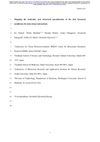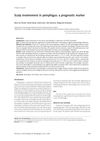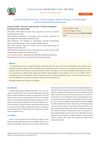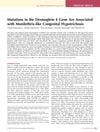 February 2025 in “Animals”
February 2025 in “Animals” Understanding proteins in skin structures like claws and hair is crucial for future research.
165 citations,
December 2004 in “Differentiation” BMP signaling is crucial for skin and hair growth.
 February 2021 in “Journal of Investigative Dermatology”
February 2021 in “Journal of Investigative Dermatology” Hair loss in male pattern baldness is linked to changes in specific genes and proteins that affect hair growth and scalp health.
 2 citations,
January 2013 in “Elsevier eBooks”
2 citations,
January 2013 in “Elsevier eBooks” The document explains the genetic causes and characteristics of inherited hair disorders.
 24 citations,
October 2014 in “Cold Spring Harbor Perspectives in Medicine”
24 citations,
October 2014 in “Cold Spring Harbor Perspectives in Medicine” Genetic research has advanced our understanding of skin diseases, but complex conditions require an integrative approach for deeper insight.
 11 citations,
December 2014 in “The American journal of pathology”
11 citations,
December 2014 in “The American journal of pathology” A gene deletion in mice causes weak protein, immune issues, hair loss, airway problems, and wasting disease.
 9 citations,
January 2022 in “Theranostics”
9 citations,
January 2022 in “Theranostics” Collagen XVII is important for skin aging and wound healing.
 7 citations,
December 2013 in “The Journal of Dermatology”
7 citations,
December 2013 in “The Journal of Dermatology” A woman's hair turned gray and fell out after starting a cancer drug called imatinib mesylate.
 2 citations,
April 2020 in “bioRxiv (Cold Spring Harbor Laboratory)”
2 citations,
April 2020 in “bioRxiv (Cold Spring Harbor Laboratory)” The skin's basement membrane is specially designed to support different types of connections between skin layers and hair follicles.
 1 citations,
April 2021 in “The journal of investigative dermatology/Journal of investigative dermatology”
1 citations,
April 2021 in “The journal of investigative dermatology/Journal of investigative dermatology” mTORC1 activity is important for hair growth and color, and targeting it could help treat hair loss and greying.
 1 citations,
April 2021 in “Journal of Investigative Dermatology”
1 citations,
April 2021 in “Journal of Investigative Dermatology” The ingredients could help prevent hair loss by promoting hair growth and increasing VEGF secretion.
 1 citations,
January 2012 in “Elsevier eBooks”
1 citations,
January 2012 in “Elsevier eBooks” The document concludes that the skin is a complex organ providing protection, sensation, and healing, with challenges in treating conditions like itchiness.
 April 2021 in “The journal of investigative dermatology/Journal of investigative dermatology”
April 2021 in “The journal of investigative dermatology/Journal of investigative dermatology” The anti-hair loss shampoo effectively promotes hair growth and improves hair quality.
 508 citations,
February 2007 in “Cell”
508 citations,
February 2007 in “Cell” Epithelial stem cells are crucial for tissue renewal and repair, and understanding them could improve treatments for damage and cancer.
 35 citations,
May 2021 in “Nature communications”
35 citations,
May 2021 in “Nature communications” The skin's basement membrane has specialized structures and molecules for different tissue interactions, important for hair growth and attachment.
 13 citations,
January 2018 in “BioMed Research International”
13 citations,
January 2018 in “BioMed Research International” Scalp involvement is common in pemphigus and can lead to hair loss, with the severity of scalp lesions linked to overall disease severity.
 10 citations,
November 2017 in “Advances in Dermatology and Allergology”
10 citations,
November 2017 in “Advances in Dermatology and Allergology” Scalp involvement in pemphigus means the disease is more severe and harder to treat.
 8 citations,
May 2021 in “Bioengineering & translational medicine”
8 citations,
May 2021 in “Bioengineering & translational medicine” Hair growth environment recreated with challenges; stem cells make successful skin organoids.
 August 2023 in “Acta Scientific Paediatrics”
August 2023 in “Acta Scientific Paediatrics” A baby from an Indian family had a rare genetic disorder causing no scalp or body hair due to a specific gene deletion.
 September 2022 in “Frontiers in genetics”
September 2022 in “Frontiers in genetics” A Chinese male with a new genetic mutation has a skin condition and severe urinary issues, with treatments having mixed success.
 December 2021 in “Molecular genetics and genomics”
December 2021 in “Molecular genetics and genomics” Cats with abnormal hair had DSG4 gene changes causing hair problems.
 May 2013 in “Springer eBooks”
May 2013 in “Springer eBooks” Skin problems in the elderly are unique and may indicate other diseases, involving changes in skin, hair, nails, and increased cancer risk.

Integrin alphavbeta6 is important for wound healing and hair growth, and blocking it may improve these processes.
 223 citations,
January 2014 in “International Journal of Molecular Sciences”
223 citations,
January 2014 in “International Journal of Molecular Sciences” The conclusion is that proper signaling is crucial for hair growth and development, and errors can lead to cancer or hair loss.
 174 citations,
November 2016 in “Cell stem cell”
174 citations,
November 2016 in “Cell stem cell” Different types of skin cells have unique genetic markers that affect how likely they are to spread cancer.
 95 citations,
February 2019 in “The New England Journal of Medicine”
95 citations,
February 2019 in “The New England Journal of Medicine” Mutations in the PADI3 gene are linked to a higher risk of scarring hair loss in women of African descent.
 89 citations,
September 2010 in “Annual Review of Genomics and Human Genetics”
89 citations,
September 2010 in “Annual Review of Genomics and Human Genetics” The document concludes that understanding the genes and pathways involved in hair growth is crucial for developing treatments for hair diseases.
 86 citations,
October 2005 in “Experimental Dermatology”
86 citations,
October 2005 in “Experimental Dermatology” The Foxn1 gene mutation causes hairlessness and immune system issues, and understanding it could lead to hair growth disorder treatments.
 74 citations,
January 2006 in “The journal of investigative dermatology/Journal of investigative dermatology”
74 citations,
January 2006 in “The journal of investigative dermatology/Journal of investigative dermatology” Mutations in the DSG4 gene can cause a rare hair disorder similar to monilethrix.
 69 citations,
June 2017 in “Experimental Biology and Medicine”
69 citations,
June 2017 in “Experimental Biology and Medicine” Advanced human skin models improve drug development and could replace animal testing.





























